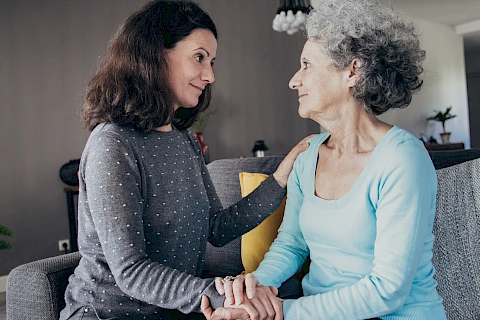
Mental health screenings for seniors help detect problems early, which can lead to better outcomes. However, adult children often need to advocate for their senior parents or older relatives to get these vital screenings.
Senior Helpers will explain why mental health screenings are essential for seniors, how to discuss them with older family members, overcome common obstacles, and keep the conversation going without causing unnecessary stress.
Why Seniors Need Mental Health Screenings
Common mental health issues in seniors include depression, anxiety, and dementia. These conditions can significantly impact their quality of life and overall well-being. Early detection and intervention can lead to effective treatments, improved mental health, and a better quality of life.
How to Bring Up the Topic
Approaching the topic of mental health screenings with seniors requires tact and empathy. Choose the right time and place for the conversation when your loved one is relaxed and free from distractions. Use empathetic and non-judgmental language to express your concerns.
For example, you could say, "I've noticed you've seemed a bit down lately, and I'm worried about you. Would you consider talking to a doctor about it?" Sharing personal observations can help them understand your perspective without feeling attacked.
Navigating Common Obstacles
Several obstacles may arise when discussing mental health screenings with seniors. Stigma and misconceptions about mental health can be significant barriers. Many seniors grew up during a time when society did not openly discuss mental health issues, leading to feelings of shame or denial.
However, you can address this by providing accurate information and normalizing the conversation. Resistance, fear, anxiety, and denial are common reactions to the screening process. Seniors might say, "I'm fine," or "I don't need a doctor." Explain to them that screenings are routine check-ups that everyone should have and reassure them that it's a straightforward procedure.
Maintaining the Conversation
Once you have introduced the topic of mental health screenings to seniors, keep the dialogue open and ongoing. Regularly check in with your loved one to see how they're feeling and offer support. Let them know that seeking help is a sign of strength, not weakness. Involving healthcare professionals can also make the process smoother. Encourage them to discuss their feelings with their primary care physician, who can refer them to a specialist if necessary.
Contact Senior Helpers for Assistance With Senior Health
Talking to seniors about mental health screenings can be challenging, but it's an important step in ensuring their overall well-being. By choosing the right time and place, using empathetic language, and addressing common obstacles, you can help your loved one feel more comfortable with the idea of mental health screenings. Keep the conversation open and supportive, and don't hesitate to involve healthcare professionals when needed.
Encourage your loved one to take action today. Click here to find a location near you and learn more about our in-home care services at Senior Helpers. Taking the first step towards mental health screenings could significantly improve their quality of life and ensure they receive the care and support they need.

